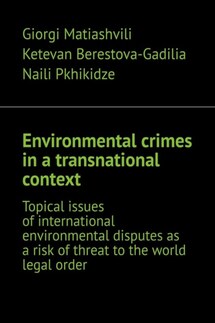Environmental crimes in a transnational context. Topical issues of international environmental disputes as a risk of threat to the world legal order - страница 3
In our opinion, the development of international environmental cooperation should follow the principle of creating a single international legal environmental act, of one international environmental organization, and of one international environmental court.
&1 International law as the basis of the international legal order
The representations on peaceful existence has been evolved from the ideas about the artificiality of peace and the naturalness of hostility and war to humanity and the individual to the axiomatic concepts extoling universal peace on the planet as the only means to avoid nuclear and environmental catastrophe. Globalization can contribute to the awareness of the fragility of the entire human civilization and the uniqueness of its constituent socio-cultural formations. In our opinion, in order to achieve peace on the planet, it is necessary to abandon attempts to unify it by force. All the richness of the nature of planet Earth and human culture cannot be simplified and unified within the framework of one geopolitical, economic and cultural paradigm. It is this kind of aggressive attempts that can lead to the complete destruction of humankind and ecological environment of his habitat. In recent decades, the problem of preserving the whole world and ecosystem (ecological system) on our planet are becoming more and more relevant, overwhelmed by various political, social and geopolitical contradictions and side effects of scientific and technological progress.
One can rightfully speak of the 21st century as an era of exacerbation of civilizational conflicts and confrontation of civilizations at a new qualitative level.
International law, its principles and basic norms help to resolve the problem, which determine its nature and create support for its other norms and institutions, contributing to the stability of international relations. They represent the foundation of the international law and order. Violation of the basic principles of international law affects the rights and interests of most other members of the international community. International law is a system of legal principles and norms governing relations between states. International organizations can also act as subjects of international law. Sources of international law are international treaties and custom recognized by states. As there is no supranational authority over sovereign states, the international law is the law between states, not over them.
Which law is more important: International or National, the answer to this question depends on the legal traditions of a particular country. Most legal theorists believe that globalization processes will only become aggravated in the future. Problems that require joint efforts, such as transnational crime, ecological and technogenic safety; prevention of armed conflicts; protection of human rights will come to the fore. This will lead to the prevalence of international norms of law over national ones. Already, many countries have fixed in the basic laws the provision for such a priority. International law in most of its norms, which are recognized by all states of the world, is universal. In the part recognized not by all, but by most countries of the world, it is called general. The norms of international law established by the countries of one region create regional international law. The norms established by states in any field, for example, in energy, or in the field of production and marketing of oil, in navigation or air traffic, are called sectoral.






